
Results
Well, it's the moment we've all been waiting for. I've tested the fluid, stained my carpet, and cut a finger. I've watched hours pass, tested and retested, emptied and refilled. And oh, the flushing. I've gone through more than four gallons of distilled water just in flushing cleaning.But all of this was for one worthy goal – is there a fluid that reigns supreme? Does anything do water's job better than water? The numbers don't lie – nothing is better than pure, straight up water so far, at least where temperatures are concerned.
But there are a couple fluids that perform just as well, and their side benefits of colouring, anti-corrosion and (most of all) non-conductivity make them well worth your time. Though temperatures are our primary concern, I've also made sure to note other aspects of each fluid that can have an effect on overall usability – colouring, bubble dispersion, and clean-up.
So which ones are truly better than water, when you take all of this into account?
Distilled Water
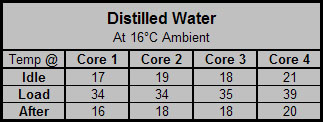 Distilled water with a five percent solution of Water Wetter was our control in this experiment. After all, the whole purpose to using a different fluid than water is in an attempt to beat it – either via temperatures proper, or by coming close and offering plenty of side benefits.
Distilled water with a five percent solution of Water Wetter was our control in this experiment. After all, the whole purpose to using a different fluid than water is in an attempt to beat it – either via temperatures proper, or by coming close and offering plenty of side benefits. Truth be told, water actually performed best in our test, at least under load. However, idle temperatures (where the split between ambient and fluid are closest) were better with a couple of the NCFs.
Water isn't perfectly ideal, though. First of all, it's conductive, which is why you're probably reading this in the first place. Second, by the time you get done adding all of the junk (dye, water wetter, etc) to prevent corrosion, colour it and stop it from turning green, you've pretty much spent the same (if not more). Third, you have the hassle of mixing all of that junk to begin with, then the difficulty of pouring that from whatever gallon or more sized container down to your system.
Fluid XP+ Ultra
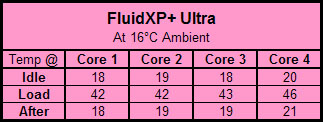 FluidXP+ Ultra was quite surprisingly the worst of the performers. Its idle temperatures were a steady two full degrees above any of the other fluids, and its performance under load was completely outclassed. Some of this may be explained by the fluid's thicker nature.
FluidXP+ Ultra was quite surprisingly the worst of the performers. Its idle temperatures were a steady two full degrees above any of the other fluids, and its performance under load was completely outclassed. Some of this may be explained by the fluid's thicker nature.It also may or may not be (at least in part) due to the company's commitment of limiting its compounds to those friendly to those dumb enough to drink it, as well as the environment. But even that feature comes at a price – many food dyes (including those used in my Blood Red sample of Fluid XP+ Ultra) are very staining, particularly on organic compounds like plastics. I'll be getting red dye out of the system for a week, and that's after five full flushes.
The pump didn't like it all that much, either – though there were no visible air bubbles after a couple hours of circulation, the pump could not get past making a loud clunking noise...loud enough to eclipse both 120mm fans running at full speed. When I drained the system and rinsed it out, the pump went back to normal – so there was nothing wrong with the machine. The problem happened on both test runs (each from a different bottle of fluid), so I would not expect it to be just my sample.
Between the dye problems, the poor performance and the noise, it would be hard to recommend FluidXP+ Ultra even if it were cheaper than the other brands. However, at almost 50 percent more expensive in both the US and the UK than the closest-priced alternative, it's not hard to say to steer clear.
MCT-40
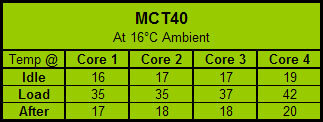 MCT-40 has been around the block, and the guys at Midwest Cooling Technologies know pretty well what they're doing by now. What's a true testament to engineering is how much of a timeless workhorse the stuff really is. It keeps the temps right down there next to water, and it's actually easier to use.
MCT-40 has been around the block, and the guys at Midwest Cooling Technologies know pretty well what they're doing by now. What's a true testament to engineering is how much of a timeless workhorse the stuff really is. It keeps the temps right down there next to water, and it's actually easier to use. As I mentioned, MCT-40 is also a fairly high-viscosity compound, much like FluidXP+ Ultra. However, the pump didn't seem to have the same issue moving it through the loop. Despite my initial thoughts, bubbles disappeared from the system in no time leaving a quiet-running and very cool system.
Of course, there is a downside with this one. MCT-40 comes in a container reminiscent of some 5W30 oil, and it fits that bill a little too closely. Its pea-soup green colour and lack of any UV additive means that many people with clear tubing may not find it to their tastes. For those that get past the looks, there's also the smell to contend with – my dog took a whiff of the second rinse after this fluid and looked as though I was going to poison him.
Unfortunately, it's not the cheapest of the bunch – but it does do the job, and if you have it in your system I'd say you'll be quite happy with it. If toxic sludge is your theme, then MCT-40 has you covered – and comfortably cool to boot.
Feser One
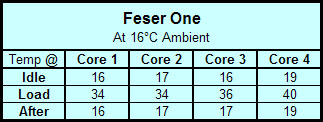 Feser One is the new kid on the block – and because of that, I really expected a lot out of it. Fortunately, Smoothy Gennat and company deliver – there's really not much to dislike about this product.
Feser One is the new kid on the block – and because of that, I really expected a lot out of it. Fortunately, Smoothy Gennat and company deliver – there's really not much to dislike about this product.Feser One outperformed every liquid in the test at idle, including water. As the deltas crept up under load it slipped back consistently by a degree, but that is frankly within the realm of possible rounding error. Even if not, it was only a single degree.
When handling the compound, it even felt like water...enough so that I tested the non conductive part—Warning, don't try this at home—by spraying a bit on my motherboard and a couple drops on the OCZ GeForce 8800 GTX that's on my test bench. I'm happy to report that it's all still functioning quite well, despite letting it puddle a bit. Once I shut the system off, I wiped it off to no ill effect.
So, the good news is that a controlled leak won't mean the end of your hardware...but what about the other benefits? Well, Feser comes in the largest colour variety of fluids to date. The electric-blue colour washed out of my loop within three rinses of distilled, so it's not likely to linger or stain if you decide to change colours in your mod. It's also the only company that thought to include a spray nozzle as well as a cap for the one litre bottles, making it easy to top off or fill a small loop without mess – or a funnel.
All of this is wrapped together in a price tag that's well below any of the other fluids. Like I said, there's really just not much to dislike about Feser One – which is why it wins the bit-tech Award of Excellence. With such a good alternative, there's little point to taking the risk with water.

Feser One Coolant

MSI MPG Velox 100R Chassis Review
October 14 2021 | 15:04

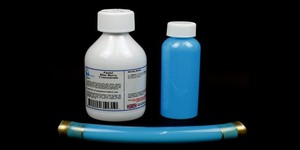






Want to comment? Please log in.